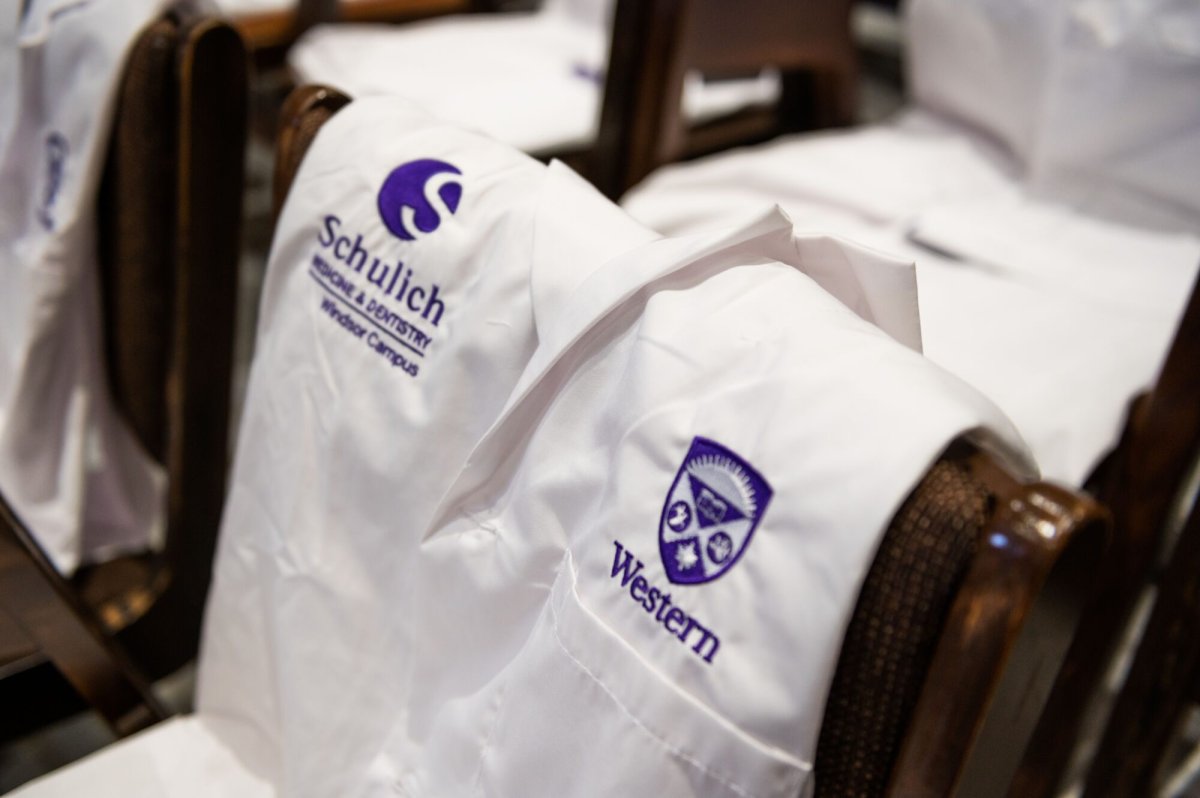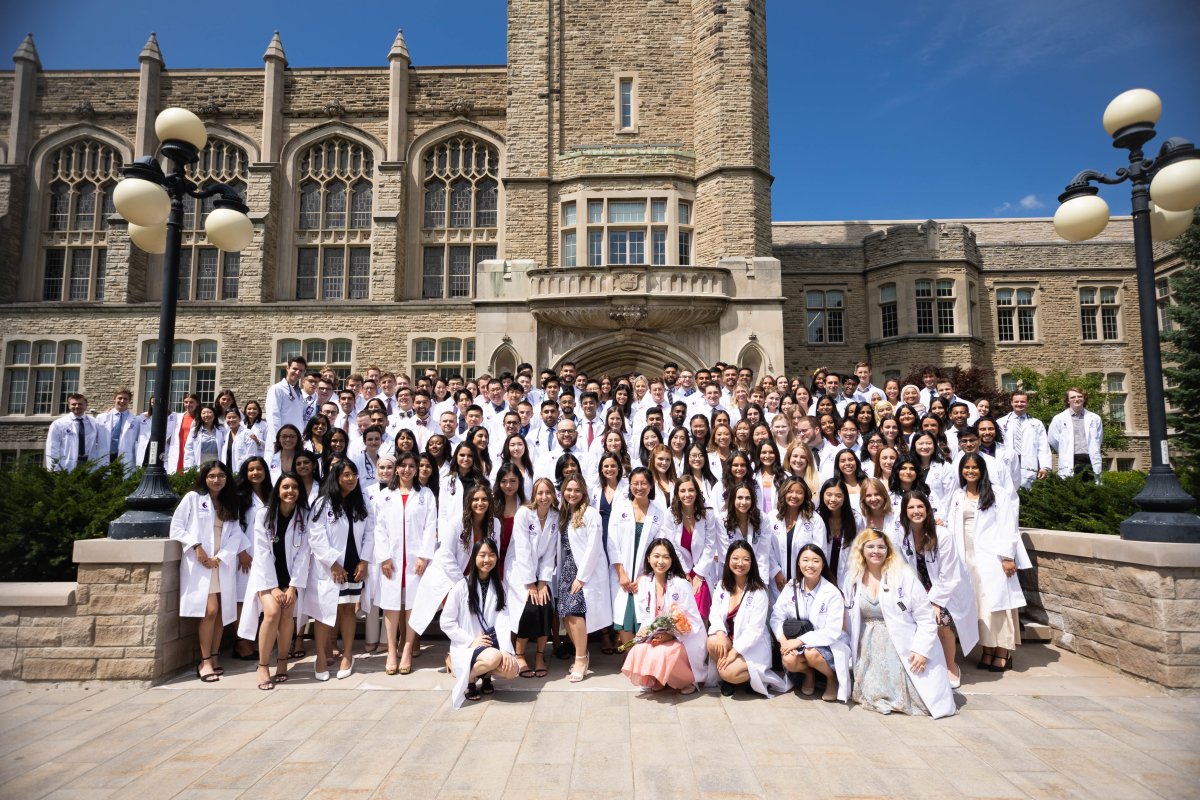The Province of Ontario is increasing the number of medical school spots at Western University in London, Ont., working to battle the ongoing shortage of health-care professionals.

The government announced Thursday that the Schulich School of Medicine and Dentistry will add 16 medical education spots and 22 residency training positions over the next three years, starting this fall.
Rob Flack, MPP for Elgin-Middlesex-London, wrote in a statement that the hope for these additional spots is to create “more opportunities for Ontario students to be trained locally.”
“Adding undergraduate and post-graduate medical training positions at the University of Western Ontario is one part of our government’s comprehensive strategy to deliver solutions for our health-care challenges,” he said. “These additional spaces will help us meet the growing demand that is being placed on our health-care professionals.”

The new positions are part of the government’s plan – announced in the provincial budget for 2023 – to expand medical school education through a new investment of $33 million over the next three years. The funding is creating a total of 100 undergraduate medical school seats starting this year, and another 154 postgraduate medical training seats beginning in 2024.
The government said that 60 per cent of the new postgraduate training seats will be in primary care and 40 per cent will be in specialty care.
“Medical education expansion is a key part of our government’s plan to connect London’s growing population to health care closer to home,” said Jill Dunlop, minister of colleges and universities. “We’re training the next generation of Ontario doctors right here at home.”
- Trudeau tight-lipped on potential U.S. TikTok ban as key bill passes
- Canadian man dies during Texas Ironman event. His widow wants answers as to why
- Hundreds mourn 16-year-old Halifax homicide victim: ‘The youth are feeling it’
- On the ‘frontline’: Toronto-area residents hiring security firms to fight auto theft
According to the province, the medical school spot expansion will bring the total number of undergraduate seats in Ontario to more than 1,200, along with at least 1,600 postgraduate medical training positions by 2028.
“Increasing the number of doctors and other health-care workers trained in Ontario will enhance access to care for communities throughout the province,” added Sylvia Jones, Deputy Premier and Minister of Health. “Whether these students go on to work in primary care, a hospital, or in the community, this investment is another part of our plan to grow our health workforce and help connect Ontarians to convenient care for years to come.”
Alan Shepard, president of Western University, applauded the province’s investment in medical education not only across Ontario, but within the Schulich School of Medicine and Dentistry.
“Since many physicians eventually practice in the locations where they train, we know this expansion will translate into more doctors caring for our region, which is among the fastest-growing in Canada,” he said.

According to Dr. John Yoo, dean of Schulich Medicine and Dentistry, the school currently has 171 first-year undergraduate medical education seats, 133 of which are in London with the remaining 38 at its Windsor, Ont., campus.
He said that recently announced spots will bring the totals to 187 undergraduate seats and 230 residency training spots, calling the news “absolutely tremendous.”
“Not only for our medical school, but for all the people in the vast and growing region we serve, from Woodstock to the Great Lakes and Owen Sound to Windsor-Essex,” he said. “Many of these communities are experiencing significant health-care challenges.
“You can hardly turn on the news these days without hearing the concern that every Canadian has about the shortage of physicians, especially primary care physicians and the challenges to the system, particularly in the last three years with COVID which has really brought any apparent challenges to the forefront,” Yoo continued.
“People are hurting, and we are in the business of training doctors who can help … (and) this is a very important part of a larger strategy in increasing health human resources in Ontario.”
Just last year, 28 postgraduate residency spots were added to the existing 185 at the university through provincial funding.
Additionally, Western received support from the government to expand its 19-month program for registered practical nurses in allowing them to obtain a Bachelor of Science and Nursing degree. The program grew to around 232 seats last year, a “dramatic increase” from 100 seats in 2020, and 135 in 2021.
Yoo highlighted that aside from increasing medical school spots, the 2023 provincial budget also includes the funding to construct a new Windsor-Essex Acute Care Hospital.
Western launched the Schulich Medicine and Dentistry Windsor campus back in 2008, with support from the province. Since then, Yoo said that “the campus has led to over a 35 per cent increase in family physicians, as well as a 31 per cent increase in specialists practicing in the area.”
“More than 80 per cent of family medicine graduates have chosen to stay in Windsor-Essex to practice, resulting in almost 100 new physicians joining the region,” the university wrote in a statement.

Yoo said the school is working with the ministry as well as the province to determine how the additional medical education and residency spots will be distributed between the London and Windsor campuses.
“We’ll work together to ensure the spots are allocated in a way that ensures the best outcomes for our trainees and the needs of the people we serve,” he said. “We’re exploring some innovative decentralized approaches to educating family physicians because where students train is probably the greatest predictor of where they’re going to ultimately stay.
“We are committed to the idea that it’s not just about creating more physicians, it’s about educating more physicians to go and serve the diverse needs of Ontario, and that includes rural, regional, Indigenous communities, as well as urban communities, but we want to make sure that we are addressing the concerns and the needs of our society,” Yoo concluded.









Comments